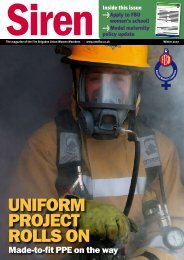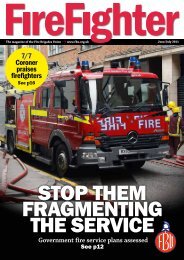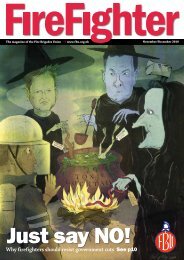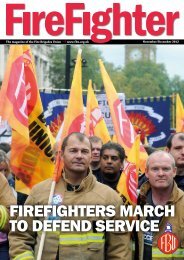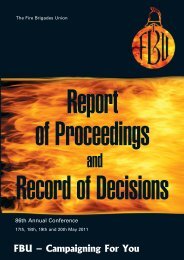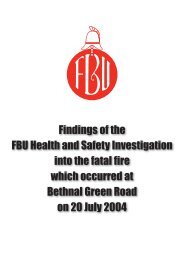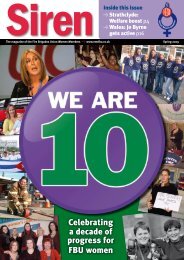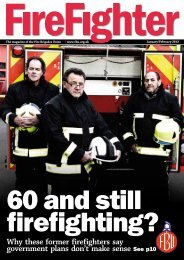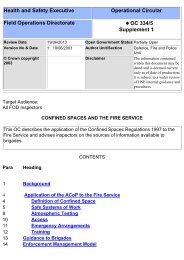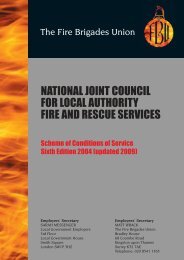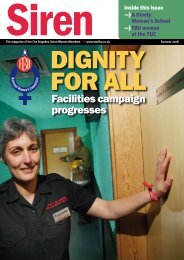Report - Fire Brigades Union
Report - Fire Brigades Union
Report - Fire Brigades Union
Create successful ePaper yourself
Turn your PDF publications into a flip-book with our unique Google optimized e-Paper software.
SECTION B — FIRE AND RESCUE SERVICE POLICY<br />
changes might be made to meet current and future<br />
challenges. At a launch workshop on 28 July 2010, fire<br />
partners came together and, with no issue left out of<br />
scope, identified a series of wide-ranging factors for<br />
consideration. These topics were grouped together and<br />
taken forward under four workstreams:<br />
● Role of the FRS (Delivery Models);<br />
● Efficiency, Effectiveness and Productivity (EEP);<br />
● Localism and Accountability; and<br />
● National Interests.<br />
Four volunteer Chairs came forward to lead the<br />
workstreams, each responsible for coordinating the work of<br />
their groups and for ensuring that the whole sector had the<br />
opportunity to participate and present options. This was<br />
essential given the 232 volunteers and 53 representative<br />
bodies who devoted time and expertise to the review.<br />
Workstream Chairs were as follows:<br />
● Cllr David Milsted, Dorset FRA (from September 2010)<br />
Both the submissions and the virtual sounding pool formed<br />
part of much broader engagement activity including the<br />
whole sector. All along, the review sought to include as<br />
many different viewpoints as possible, and to this end a<br />
concerted engagement process began in October with a<br />
series of workshops hosted by Chairs and sub-stream<br />
leads. Designed to challenge emerging thinking, each<br />
workshop held lively debates on developing themes and<br />
the review’s wider direction of travel. The robust challenge<br />
offered by the 136 attendees helped hone workstream<br />
ideas as initial sub-stream reports were written and<br />
developed for still wider discussion.<br />
With the sub-stream reports in place, workstreams<br />
highlighted their key themes in a series of questions which<br />
were shared with the whole sector for comment and<br />
challenge. From 22 October until 2 November, a ‘Have<br />
Your Say’ period was held in which all Chiefs, Chairs,<br />
interested organisations and individuals were invited to<br />
give their perspectives on the workstreams via email.<br />
●<br />
●<br />
●<br />
Cllr Paul Shannon, Greater Manchester FRA, (to<br />
September 2010) (Role of the FRS (Delivery Models))<br />
CFO Max Hood, West Sussex FRS (EEP)<br />
Cllr Andre Gonzalez De Savage, Northamptonshire FRA<br />
(Localism and Accountability)<br />
All of the ‘Have Your Say’ responses, partner submissions<br />
and sub-stream papers were then gathered together and<br />
used by workstream Chairs to shape their final reports.<br />
Although received after sub-stream leads had developed<br />
their reports, CFOA’s submission was also considered by<br />
Chairs in this way.<br />
●<br />
Brian Robinson, Association for Specialist <strong>Fire</strong><br />
Protection (National Interests).<br />
The workstream Chairs were each members of the sectordominated<br />
<strong>Fire</strong> Futures Steering Group established to<br />
oversee the review. Over five meetings, Chairs kept<br />
Steering Group members apprised of workstream activity<br />
and responded to member suggestions and challenge on<br />
the direction of travel.<br />
With Chairs and volunteers in place, workstreams set<br />
about dividing their topic areas into a series of sub-stream<br />
issues overseen by volunteer leads. As sub-stream topics<br />
were taken forward, each workstream developed its own<br />
working style to generate options. The Role of the FRS<br />
(Delivery Models), EEP and Localism & Accountability<br />
workstreams developed sub-stream papers as initial<br />
prompts for discussion, and seven workstream papers<br />
were prepared in the first few weeks alone. The National<br />
Interests workstream expanded the remit of the group to<br />
include innovative thinking on decentralisation and its<br />
implications for the wider sector. As work progressed, the<br />
group commissioned eight working papers and a number<br />
of think pieces to inform their debate.<br />
Organisations provided vital input into the review in two<br />
main ways; through providing submissions and through<br />
offering virtual sounding pool resource. A total of nineteen<br />
submissions were received from partner organisations,<br />
including the LG Group, providing organisational insight into<br />
<strong>Fire</strong> Futures which helped develop workstream thinking. In<br />
addition, 36 organisations offered ongoing support to<br />
workstreams, providing advice and challenge on emerging<br />
ideas via a virtual sounding pool.<br />
3. THE REPORTS<br />
The <strong>Fire</strong> Futures reports are presented from the four<br />
workstreams. A brief summary of the topics considered by<br />
workstreams is as follows:<br />
a) Role of the <strong>Fire</strong> and Rescue Service [FRS] – Delivery<br />
Models<br />
Constituted to examine the extent and current<br />
applicability of the FRS’ role, the workstream<br />
investigated barriers to delivery, governance models<br />
and alternative service combinations. The Role of the<br />
FRS (Delivery Models) report offers a series of short<br />
and long term options conferring additional powers and<br />
responsibilities for FRAs and FRSs to tackle the barriers<br />
faced by the sector and improve delivery. Looking<br />
towards the longer term, the report identifies a new<br />
Community Protection Authority governance model<br />
and outlines options for closer working between the<br />
FRS and some aspects of emergency medical<br />
response.<br />
b) Efficiency, Effectiveness and Productivity<br />
As its name suggests, the EEP workstream examined<br />
FRS resource balance and deployment, considering<br />
options to improve cost efficiency and the potential for<br />
alternative or additional areas of income generation.<br />
Through a series of sub-stream topics including<br />
funding, pay and conditions, balance of resources,<br />
delivery models and use of assets, the workstream<br />
report suggests efficiencies can be achieved by a<br />
series of measures including a new sector-owned<br />
procurement process, clear asset management<br />
strategies and a further consideration of charging and<br />
36 FBU Annual <strong>Report</strong> 2011





